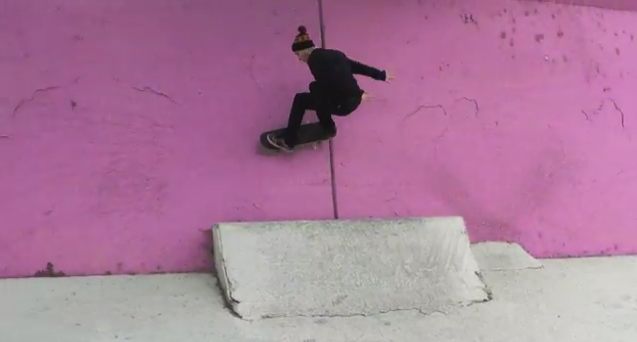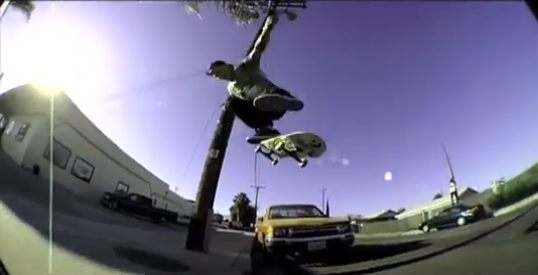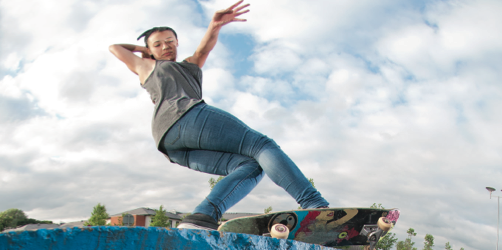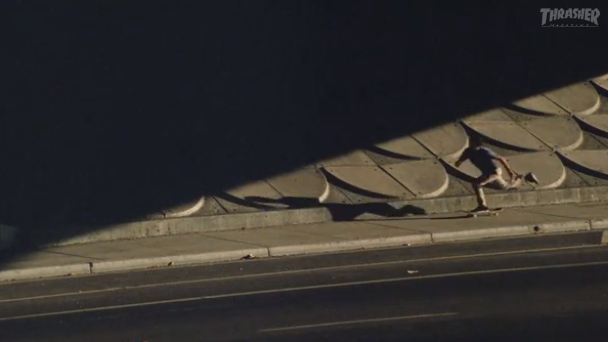From Sidewalk 202 – July 2013
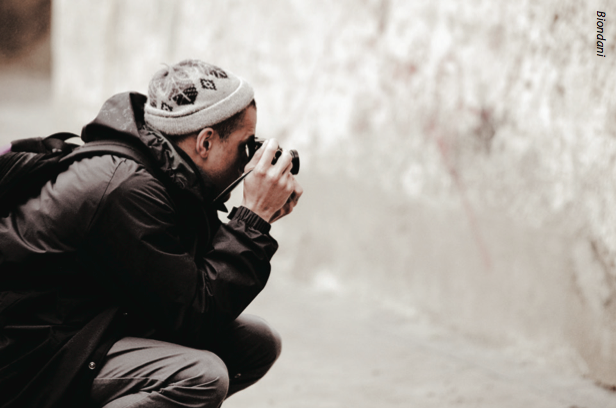
Right then Jerome, in your own words please, how would you best describe your photography?
– For me, photography is purely about capturing what interests me; it’s about securing a visual memory, recording where I have been and the people I’ve met. I use photography as a recording device; I guess it’s a visual diary.
What about your approach to shooting – do you attempt to ‘set up’ photos, or do you prefer to be more of a neutral observer?
– Not really, I have always favored the more incidental of photographs; staging a scene or a subject to me takes away a lot (if not all) of an image’s truth. I have a massive appreciation for a real and truthful photograph, something that cannot be recreated or reproduced. I cant pretend I haven’t asked someone I’m shooting to perhaps stay in a position for a few seconds longer than they naturally would have to get an image I’m happy with, but for me there is a huge line between maintaining a scene and recreating it.
Taking it back to the very beginning, what was it that made you pick up your first camera? Did the fact that you were around quite a lot of the skate industry’s finest lens-men from a young age play much of a part in your early interest?
– Being around those guys definitely played a big part in my discovery of photography. The whole process really fascinated me, I loved watching them setting up and finding their angles; it was great. It was, and still is, a blessing to have those guys around, they have subconsciously taught me so much.

What was your first camera and where did it come from?
– The first camera I owned was an old Pentax 35mm, it was given to me by my stepdad about ten years ago. I still have it somewhere but it’s slightly past its sell by date, so unfortunately it doesn’t get to come on many trips now, which is a shame. I should really dig it out and try to revive it. From what I can remember it was super easy to use – no crazy buttons or dials, you’d just point it in the general direction and shoot. I admit it didn’t produce the most epic of images, but I can safely say that wasn’t the camera’s fault.
Can you remember what your earlier photos were of? Did you work with specific themes or did you just snap whatever was in front of you?
– I think the vast majority of my initial images were purely experimental. I just liked the processes developing films and prints in the darkroom, for me it couldn’t get any better. I spent a vast majority of my time at college messing with different techniques and formats; I didn’t really have a desired subject matter at that time so I photographed almost everything.
If you could only save one photo from your pre-college days, which one would you choose?
– It would have to be an image I shot whilst on holiday with my granddad in Greece about seven years ago. We went to this brilliant woodland space out in the sticks that was completely covered with the most amazing but terflies. I’d choose this one purely for the memories it evokes as I think the actual image isn’t exactly a visual masterpiece.
 Jerome uses those quick feet that he’s blessed with.
Jerome uses those quick feet that he’s blessed with.
Backtail before the destructive twats arrived. Photo: Leung.
How far on in school did you decide that photography was something you were going to pursue in further education? Were you working with photography for any of your school projects or was this something that you were exploring during your own time?
– Not really. I remember being excited by it towards the end of school and the start of college; it was just something really new. I had no interest in it whatsoever in
school, which was a shame. I’d have likes to have found my love for it earlier on.
It must have been during the first year at college that I really got into it. I remember wanting to incorporate photography into all my projects; I would always come up with some half hearted excuse as to why photography was the best medium to work with. That didn’t go down too well in life drawing though.
You studied photography at Leeds College of Art, right? What was it that drew you to that particular college and course? And what did the course entail?
-Yeah, that’s right. I studied there for two and a half years. It was a strange decision as I never actually lived there, I guess at that time I just wasn’t ready to leave Sheffield completely but wanted to feel like I had something else going on. It was tough to commit to commuting to Leeds almost every day for that long, but looking back on it now it definitely made me a lot more productive when I was there. The course was relatively good – I don’t know about, “an hour and a half on a train every day for two years good” – but ti was fun. I struggled towards the end od the final year as it felt less and less about my photography and more about the tutors and the colleges grading system. I just felt I wasn’t really working for myself anymore so half way through a seminar I just got up and left, thought “f*ck it, I’m out”. That was a good train journey home.
Which of your college projects were you the happiest with and why?
– There were a couple of projects I really enjoyed whilst at Uni; the first has to be something I worked on with my family. I got them all in to the studio and photographed them holding pictures of each other and myself. Not exactly the most riveting of project ideas but it was something I had always The second was a project based around Sheffield’s longest running indoor market. I had so much fun shooting for this project as it was again something really personal. I presented the images I shot in a small handmade box with each image covered with archival paper. I really liked the outcome; my tutors on the other hand weren’t so impressed.
Why did you decide to commute from Sheffield, and how much time do you think you spent skating in Leeds during your course? In fact, did you ever actually bring your board with you?
– (Laughs) That’s right. I can honestly say that throughout the whole time I was there I brought my board three times. Without sounding too geeky, I was there to work and get shit done, plus getting the train home late was a nightmare. I didn’t do much in Leeds outside of going to Uni; I did all those things back in Sheffield. It was good; I enjoyed going there to learn and I proved some shit to myself in those years. Mainly discipline.

So when did you eventually finish Uni, and what qualifications did you leave with?
– Early, and none (laughing). I left midway though 2010 and do plan on completing my degree in the future, but certainly not yet.
Louis Slater told me, “you don’t need to go to Uni to be a photographer”. I probably do but I’m seeing how it goes, (laughs).
Since leaving Uni, photography has become a bit of a profession for you, hasn’t it? How and when did your first paying photography jobs come about, and what were they?
– (Laughs), I’m still waiting for it to come. I get little bits and bobs but it’s tough. I can’t say I have a mass of people asking me to photograph for them; this coupled with that fact that I’m quite picky with what I shoot ( I probably shouldn’t be) makes it even harder.
The majority of my paid work comes from selling prints, which is strange but really satisfying. It’s really nice to know that some people appreciate what it is I’m trying to do.
What would you say have been your best working experiences to date?
– It has to be something I have done for myself. As fun as it is to work for others doing commissions and whatnot, it can never beat working on your own projects.
The enjoyment and sense of achievement you get when you finish shooting and look over a whole body of completed work is just brilliant. Everything is the way you want it without any compromises, and if it’s not as good as you thought it was or should be then you have the opportunity to fix things.
On the flipside, what about the worst?
– I did once drop a Leica off the back of a motorbike at 40mph and watched it tumble down the street for about 50 yards; that wasn’t exactly a high point. Little things like working with the wrong people and trying my hardest to give them what they want when they themselves have no clue what it is they want – hence my pickiness. But all in all nothing too major, hopefully it will stay that way. Touch wood.

How does living in Sheffield affect paying work for a photographer? Is it the case that you need to travel to London more for jobs, or do you still get quite a bit of work around the South Yorkshire area?
– I try to go to London regularly, it just seems to be filled with people needing small but consistent jobs – press shots for artists and musicians mainly – even things I don’t get paid for all help. London’s just banging for networking; everyone seems to know someone who needs a little something doing.
Photography work in Sheffield on the other hand is a lot harder to come by, it does exist but in much smaller numbers. I spend a lot of my time working on my own things at home, shooting for projects and planning new stuff. It all works out really well actually; it’s so nice to be able to dip in and out of London instead of fighting to live there. Sheffield just feels like a really good place to be based, my family’s here plus money seems to last for longer.
Have you encountered many famous types whilst doing photography jobs? I remember you saying you’d been shooting late 90’s pop sensation Shola Ama the other week – how did that opportunity come about?
– (Laughs) Not really, perhaps every now and then someone relatively famous will pop up but no Jay Z’s or Rihanna’s just yet; I wouldn’t be picky about that. The Shola Ama thing was actually surprisingly easy to arrange. A good friend of mine does a show with her called “The Toddla T Sound”, so through that we managed to make it happen. It was dope – super nice people and a really good vibe. I have to say it wasn’t just to shoot Shola, but she was most definitely there, (laughs).
How do you go about balancing your role as a photographer and your role as a profes- sional skateboarder? Do you manage to keep a healthy balance between the two, or does one generally take precedence over the other?
– It’s tough at the moment; I have a really gnarly leg injury so I’m trying to fill all my time getting it sorted and shooting. Normally though skateboarding comes first as that’s my actual job I guess. Photography always comes with me though. They work together; it’s a really brilliant thing to be able to photograph new places quite regularly. actually, It’s a true blessing. I can safely say that I owe skateboarding everything, that’s why it comes first.

Obviously being an active professional skateboarder can only last for so long – with that in mind, do you see your photography becoming more of a long-term career for you? Do you ever think you’ll see the day where you’re a full time photographer?
– I’d like to think so, again that’s a really hard thing to think about. Being a skateboarder is great in so many respects, but at the same time it can be a very nomadic lifestyle if you choose it to be. By this I mean it’s hard to think about what the next move will be, I have always seemed to go with the flow but that can’t last forever. I would love to work full time as a photographer in the future; in fact, I can’t think of anything I’d like to do more.
Where do you stand on the whole ‘digital VS print’ debate? Is it still important for you to have hard copies of all of your photos or are you happy to have them all stored on drives?
– Both! I mean I completely understand and appreciate the benefits of each.
To me film is great; it looks great, it almost feels great, but at the same time it’s really expensive. Digital has its highs too, mainly its immediacy and the ability to see what you have right in front of you. To me they both work brilliantly and depending on what I’m shooting, I try to use both. Even on digitally dependent shoots people usually love how film looks, so a little of both is fine.
What is your favourite format to shoot on?
– It has to be 35mm film, especially when you have the equipment to develop and print it yourself. I could easily spend hours in a darkroom just messing with shit. It was also the format I started shooting photos on. It has a special power that digital just cant replicate; by that I don’t mean visually, I mean mentally. It literally is magic; it’s everything about the processing that I love – the smell, the light (or lack of) , and the excitement all of it just makes it an amazing experience.
 180 switch 5.0 on an Italian solid marble Toblerone. Photo: Biondani
180 switch 5.0 on an Italian solid marble Toblerone. Photo: Biondani
What does your day-to-day camera kit consist of? Do you have a preferred setup or do you vary what equipment you use depending on the task at hand?
– I shoot with two cameras – one digital and one film. The digital is a Fuji X100S, and the film is a Contax T2. They’re both relatively small cameras because I hate lugging masses of crap around. I don’t carry much else if I’m honest, perhaps some batteries and occasionally a flash, but I really try to keep it down to a minimum.
What’s your take on Social Media apps like Insta- gram? Are you happy to see photography getting more public attention these days, or do these kinds of apps and their constantly updated nature make the actual art of still photography appear more dispos- able than ever?
– Instagram is great; people that dislike it, and especially people that dislike it for that reason, are tripping. If you don’t like it, hold down the home button and delete it. Social Media apps and sites are brilliant formats for people to get their work out there and seen by the masses. Photographs are taken to be seen.
Over the years, whose photography has really stood out to you? Are there any photographers who have really influenced your style and approach?
– Far too many to mention. I mean I love both old and new stuff, and work from all over the world. A photographer called Rebecca Norris has done some amazing work recently, but honestly, there are loads.
 Frontside nosebluntslide on the Pope’s bus stop, here comes the number 666 to Bradford.
Frontside nosebluntslide on the Pope’s bus stop, here comes the number 666 to Bradford.
Photo: Biondani
What about skateboard photography – have you ever dabbled with it? Is this something you could see your- self getting into eventually or do you prefer to keep your skating and photography separate?
– I really appreciate good skate photography, but it’s not for me. I just can’t get into it, there just seems to be so much going on. You have to be an incredibly patient person to shoot skate photos and that just isn’t me.
Those guys are usually so gnarly too – jumping fences, lying on the freezing ground for hours, carrying flashes and shit…amazing, but no thanks.
You’ve spent quite a lot of time over the last few years traveling to interesting places – where have been some of the best places you’ve visited in terms of both skating and photography?
– I was lucky enough to go to Beirut midway through last year, and it was truly incredible; unlike any place I have ever been before. Everything about the place was amazing, except some skate spots. Strangely though, I hardly shot any photographs at all; I think it was all just too much to take in. This, and the fact that it was literally boiling…
New York is definitely up there too. As far as places to skate and shoot photographs go, it doesn’t really get much better. Everything just feels so constant; nothing slows down, not even through the night. It’s just incredibly interesting, both visually and mentally.
I shot a lot of photographs in and around Williamsburg and the Jewish community, with a fair few of those images being used in the ‘Young’ exhibition. New York is just one of those places that feels kind of magical and surreal. I guess for me that comes from seeing so much of it in the movies and whatnot. It’s a truly eye opening place.
 How many different exhibitions have you been involved in thus far? What was the idea behind your recent standalone show ‘Young’ in Sheffield?
How many different exhibitions have you been involved in thus far? What was the idea behind your recent standalone show ‘Young’ in Sheffield?
– ‘Young’ is a collection of images I shot whilst in New York. There was no real direction or narrative behind the work, it was more about recollections and memories. The show included a heap of my favorite images from each of the boroughs. The images were up for about a month in a really nice place that was connected to the skateshop in Sheffield. Cheers Ash.
I’m actually planning an exhibition for the start of July. The photographs are predominantly Sheffield based with strong links to the late 80s and early 90’s, so another central location would work brilliantly. I haven’t looked too into it as of yet but hopefully within the next weeks my plans will start to develop.
Can you remember the point where photography became more than just a hobby
to you?
– I don’t think it is more than a hobby to me; I hope it stays that way too. I try not to take it too seriously, that way it keeps everything mellow. I enjoy shooting for my own projects more than anything so stress is kept down to a bare minimum (laughs). Shooting photographs is a release just like skateboarding; I don’t want it to feel forced so I don’t let it take over.
And lastly, if you could shoot anything or anyone in the world, what you choose and why?
– (Laughing) It’s a strange one; it would have to be somewhere really odd like Alcatraz or something like that. Imagine the stories and adventures you’d come across; that would be truly brilliant.



